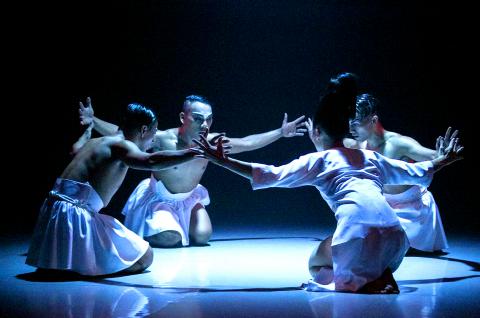The nine-year-old Tjimur Dance Theatre (蒂摩爾古薪舞集) is back in Taipei from its base in Pingtung County with its latest production, “似不舞[s]” — which the company refers to in English as “As Four Step.”
The company was founded in Pingtung’s Sandimen Township (三地門) by Ljuzem Madiljin, its artistic director, and her brother Baru Madiljin, who choreographs its works, to promote indigenous dance and music as well as contemporary dance. Its name comes from the “Tjimur” community of Paiwan Aboriginals, known as the cradle of Paiwan culture.
Baru, a graduate of the Taipei National University of the Arts' (國立臺北藝術大學) School of Dance, spent 10 years living in Taipei, but yearned to return home to work with a company that could tell stories of Paiwan culture and tradition on the world stage.

Photo courtesy of Tjimur Dance Theatre
The company has had a good year, earning strong reviews once again with their second appearance at the Edinburgh Fringe Festival this summer, with Gaze of the Kavaluan, which examined the clashes between modern life and cultural traditions, especially the notion of chastity.
Ljuzem has been quoted as saying that “everything we do is a mix of modern and traditional styles.”
The new production, which premiered in Kaohsiung last month, is set on four dancers, and is more focused on pure movement, examining the relationship between a body’s limbs and actions, familiar and unfamiliar gestures.
The basic concept is the traditional Paiwan four-step dance, with the dancers, arms linked, moving in unison, breathing in unison. It may appear simple, but the company says there is a rich body vocabulary, linked by both the movements and the chanting and humming of Paiwan singers.
The show runs 60 minutes, with no intermission and latecomers will not be admitted.
The basic ticket is NT$500, but there are a limited number of NT$2,500 “sponsorship” tickets, which give the buyer a reserved seat and a gift.
Performance notes:
WHAT: 似不舞[s] (As Four Step)
WHEN: Tomorrow and Saturday at 7:30pm, Saturday and Sunday at 2:30pm
WHERE: Experimental Theater (國家實驗劇場), 21-1 Zhongshan S Rd, Taipei City (台北市中山南路21-1號)
ADMISSION: Tickets are NT$500 and NT$2,500, available at NTCH box offices, online at www.artsticket.com and convenience story ticket kiosks. The NT$500 seats are sold out for both matinees.
This story has been amended since it was first published to correct some of the Romanization of names.

“How China Threatens to Force Taiwan Into a Total Blackout” screamed a Wall Street Journal (WSJ) headline last week, yet another of the endless clickbait examples of the energy threat via blockade that doesn’t exist. Since the headline is recycled, I will recycle the rebuttal: once industrial power demand collapses (there’s a blockade so trade is gone, remember?) “a handful of shops and factories could run for months on coal and renewables, as Ko Yun-ling (柯昀伶) and Chao Chia-wei (趙家緯) pointed out in a piece at Taiwan Insight earlier this year.” Sadly, the existence of these facts will not stop the

Taiwan is one of the world’s greatest per-capita consumers of seafood. Whereas the average human is thought to eat around 20kg of seafood per year, each Taiwanese gets through 27kg to 35kg of ocean delicacies annually, depending on which source you find most credible. Given the ubiquity of dishes like oyster omelet (蚵仔煎) and milkfish soup (虱目魚湯), the higher estimate may well be correct. By global standards, let alone local consumption patterns, I’m not much of a seafood fan. It’s not just a matter of taste, although that’s part of it. What I’ve read about the environmental impact of the

It is jarring how differently Taiwan’s politics is portrayed in the international press compared to the local Chinese-language press. Viewed from abroad, Taiwan is seen as a geopolitical hotspot, or “The Most Dangerous Place on Earth,” as the Economist once blazoned across their cover. Meanwhile, tasked with facing down those existential threats, Taiwan’s leaders are dying their hair pink. These include former president Tsai Ing-wen (蔡英文), Vice President Hsiao Bi-khim (蕭美琴) and Kaohsiung Mayor Chen Chi-mai (陳其邁), among others. They are demonstrating what big fans they are of South Korean K-pop sensations Blackpink ahead of their concerts this weekend in Kaohsiung.

The captain of the giant Royal Navy battleship called his officers together to give them a first morsel of one of World War II’s most closely guarded secrets: Prepare yourselves, he said, for “an extremely important task.” “Speculations abound,” one of the officers wrote in his diary that day — June 2, 1944. “Some say a second front, some say we are to escort the Soviets, or doing something else around Iceland. No one is allowed ashore.” The secret was D-Day — the June 6, 1944, invasion of Nazi-occupied France with the world’s largest-ever sea, land and air armada. It punctured Adolf